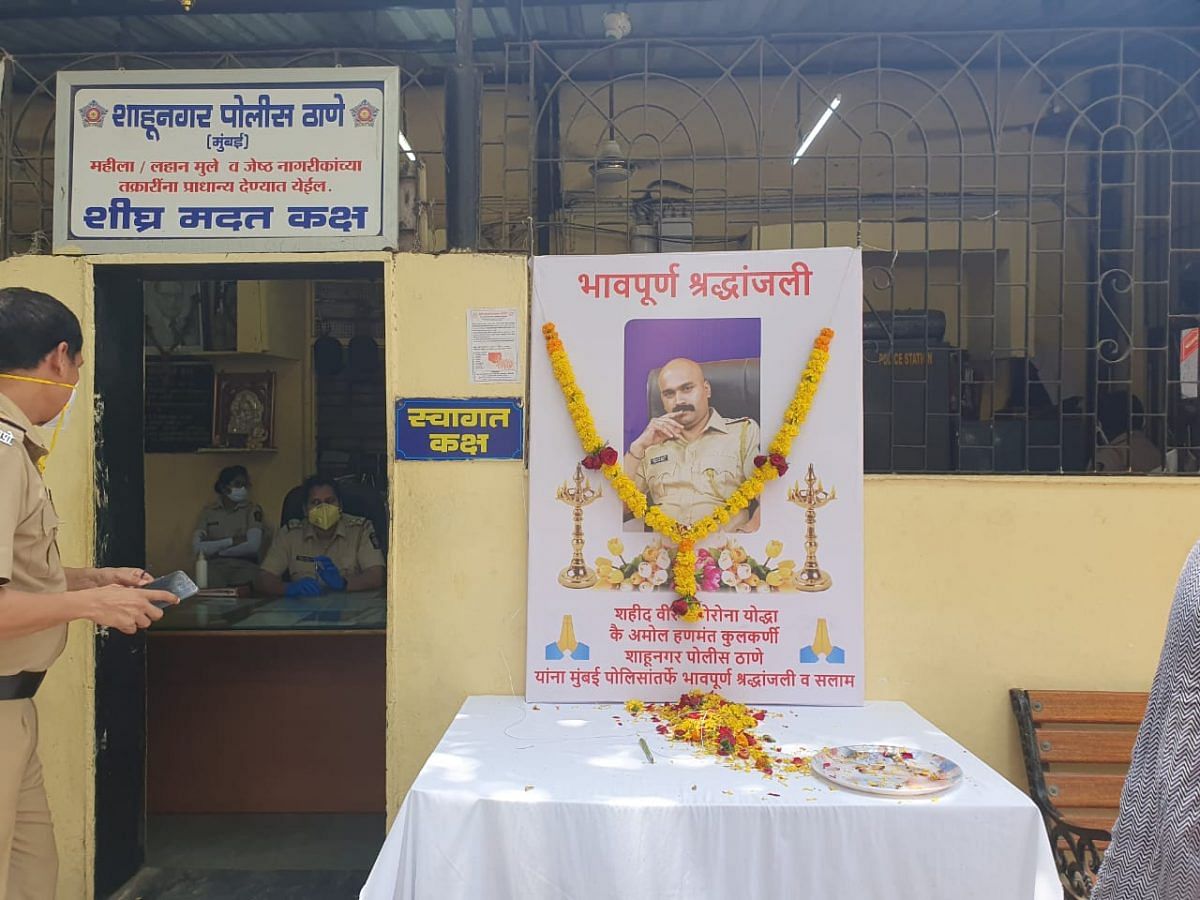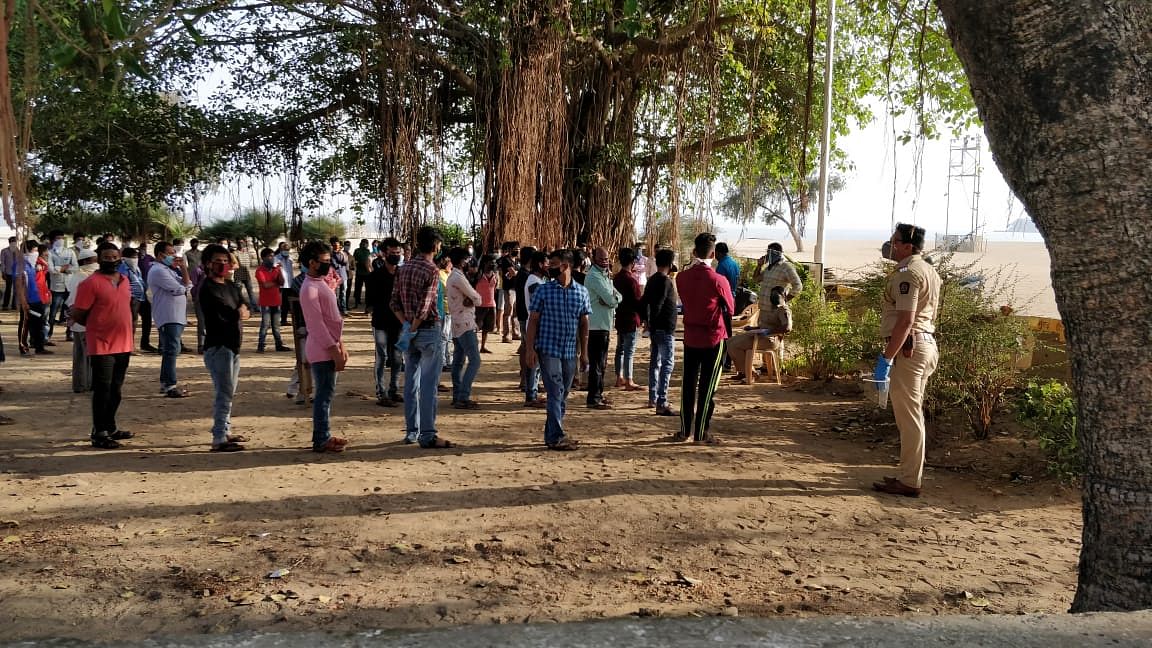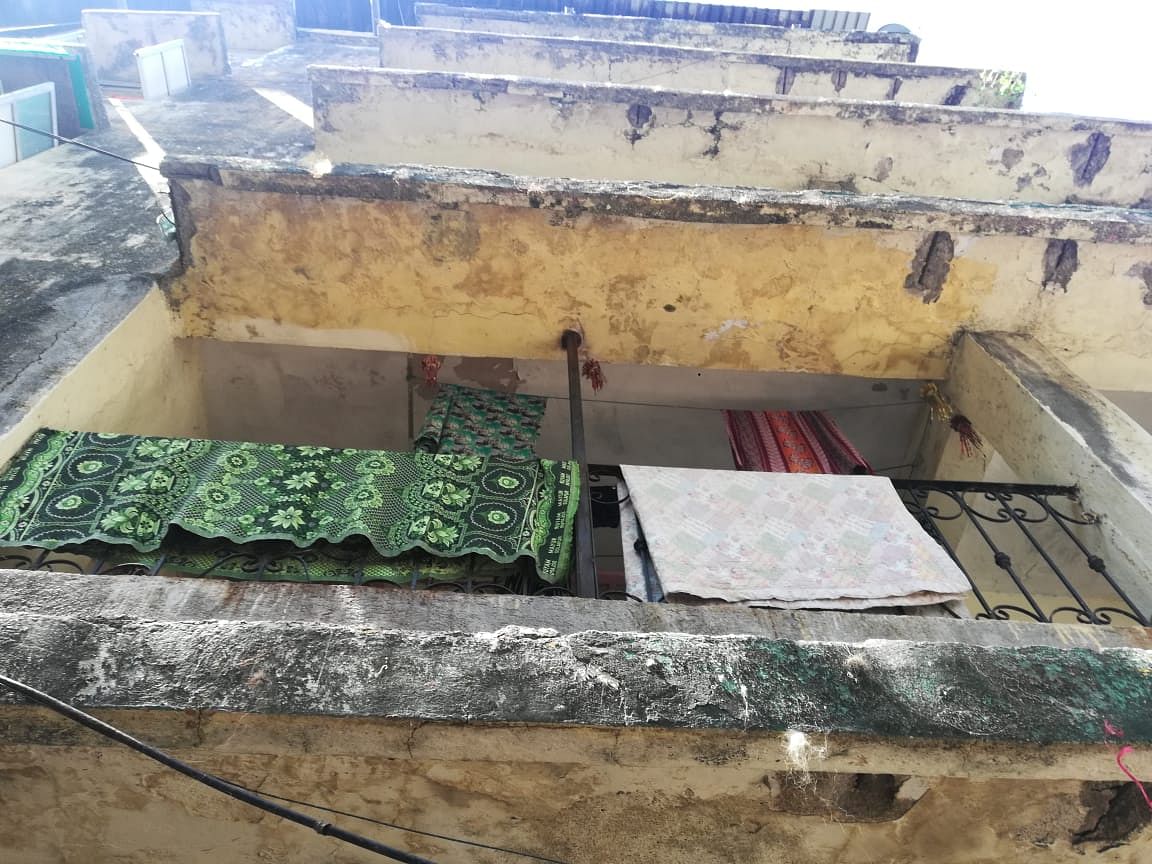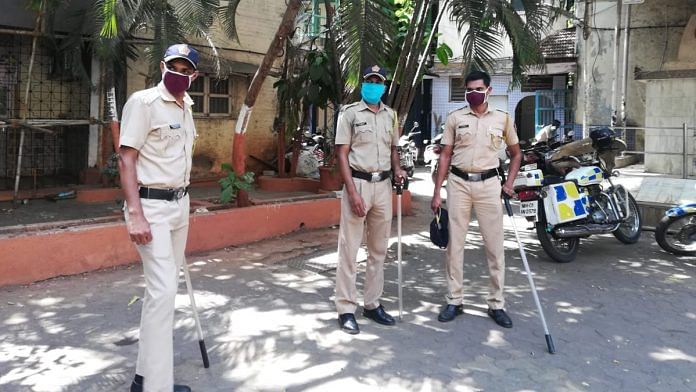Mumbai: Every day before he leaves home for a 12-hour shift, 42-year-old assistant sub-inspector (ASI) Raut of the Mumbai Police pops in four homoeopathic Arsenic Albumin 30 pills, takes another Ayurvedic decoction “to boost immunity” and some whey protein “to build strength”.
He also carries hot water along with his lunch, and has a bottle of sanitiser handy in his pocket. While there is no evidence that Ayurvedic or hompeopathic remedies protect against Covid-19, Raut is taking no chances.
For the police force in Maharashtra, particularly the Mumbai Police, has been severely affected by the Covid-19 pandemic.
As of 1 June, the total number of Maharashtra Police personnel who got infected with Covid is over 2,500, and nearly 1,500 of them are from the Mumbai Police. The total number of active Covid cases among Maharashtra Police personnel is 1,514, with 191 of them officers. While more than 800 of these 1,514 personnel are from the Mumbai Police, the rest are mainly from Thane, Pune and Nashik districts, officers told ThePrint.
As many as 27 police personnel in Maharashtra have died of Covid until now, and at least 16 of them are from the Mumbai Police.
Another 4,448 police personnel have been quarantined in Mumbai.
In comparison, Delhi and Tamil Nadu, two of the worst Covid-affected states, have a total of nearly 450 police personnel each who caught the infection, according to official sources in the two states. These states don’t release periodic data on coronavirus-affected policemen unlike Maharashtra.
Raut’s workplace, the Nagpada police station, alone has had 13 positive cases. All of them have recovered but Raut says he has to be very careful. The ASI says he sprays himself a sanitiser before entering home and goes straight for a hot water bath before touching anything in his home.
The Mumbai Police was also initially given Vitamin C and Vitamin D supplements as well as hydroxychloroquine (HCQ) tablets as prophylaxis against Covid-19 but the anti-malarial drug has been discontinued after the World Health Organization said it offered no benefit in the fight against the virus.
The Indian Council of Medical Research, however, recommends HCQ for frontline healthcare workers, paramilitary staff and police personnel engaged in coronavirus-related activities. It has also written to the WHO disagreeing with its assessment.
The Covid-19 risk, meanwhile, is very real for the police in Maharashtra, particularly in Mumbai.
Long hours on the frontlines, with bare minimum protective gear, in the worst affected state, deplorable living conditions in some of the most densely populated areas and poor fitness have made the police personnel one of the groups most susceptible to the Covid-19 strain.
And there is no respite for them any time soon. The Maharashtra government has extended the lockdown until 30 June, announcing a calibrated easing of restrictions in red zones such as Mumbai from 3 June.
Also read: How patients in Mumbai are losing crucial hours running between hospitals for ICU beds
Living conditions, long hours and fitness
According to top police officers, the high number of positive cases among Maharashtra Police personnel is a corollary of the infection rate in the general population. Maharashtra is the worst affected state in the country — as of 30 May, the state had 34,890 active cases with 2,197 deaths.
Mumbai alone accounts for 20 per cent of India’s cases.
“The numbers are reflective of what is happening in the city,” said Nawal Bajaj, Joint Commissioner (Administration), Mumbai Police.
Another senior police officer said the Mumbai Police is plagued by a problem of low immunity among its personnel, exacerbated by poor living conditions, long duty hours and the fitness of constables and mid-level police personnel.
“Senior-level officers are high on fitness as a trim personality is often a clincher for higher-level promotions. This is not the norm but it is not easy to spot an out-of-shape top level policeman,” the senior officer said. “At the level of the constables and the mid-level personnel, there is not much seriousness about fitness.”
The officer added that over 65 per cent of the Mumbai Police personnel live in the slums, chawls and small flats with large families. “They have to queue at a public toilet in many cases. Their wives are not aware of their nutritional needs,” he added. “In this no-win situation, health takes a back seat.”
Pradeep Awate, who heads the Maharashtra epidemiology cell, said, “Police men interact with more people than average, which puts them at risk though not as high as that of healthcare workers. Further, long hours, being posted far away from home and uncertain meal times also impact a policemen’s health, adding to the risk.”
But Maja Daruwala, senior advisor, Commonwealth Human Rights Initiative working on police reform, said the problem is also of the officialdom not taking care of the lower ranks of the force.
“So much illness in one set of the population is a culmination of various factors, especially the long-term lack of attention given to the well-being of the constabulary by the leadership,” Daruwala said, adding that policemen aren’t sufficiently educated about the precautions to be taken when mingling with the public, which needs daily reinforcing.

Lockdown duties
Police personnel on the ground say the long hours on the Covid-19 frontlines have been stressful and left them vulnerable to infection.
During the lockdown, while over half the strength of every police station was stationed for bandobast and at Covid-sensitive areas, the others were involved in the prevention of crime, investigation of cognisable offences and attending to any law and order situation that may arise.
The police stations had also been given the additional task of checking on the movement of migrants, attending to the quarantine facilities and ensuring that they reach the various railway stations for the Shramik trains. The police stations have to also coordinate with each other on the migrant movement and implement lockdown orders accordingly.
Most of the police constables ThePrint met were swamped by the task. This workload, however, is expected to reduce as registrations for Shramik trains will halt after 1 June as most migrants have returned home.
“It is an entirely clerical job, I am not sure why police have been given the task,” said a constable. “We should be left to do our job in detecting crime and enforcing the law.”
Since the lockdown began, the Mumbai Police has also cancelled all leaves.
“Every policeman is on the street, working. We are like soldiers,” another constable told ThePrint, adding that there is a dire shortage of police personnel in Mumbai.

Many police constables also questioned the Covid-19 procedures that they say has put them at risk. Chief among them is the current protocol that requires police personnel to accompany a dead Covid-19 patient from the hospital to the crematorium if the death is in their respective jurisdictions.
“We are doing this without adequate PPE, putting our lives at risk,” said a 52-year old constable at Andheri police station. “The process of handing over the body takes a few hours due to staff crunch in the hospital. Then the process of cremation can take up to six hours because of the number of bodies. There are times when we spend our whole shift in the crematorium.”
Questions are also being raised in the protection afforded — much of the force has been handed cloth masks with their logo as well as sanitisers. “We should get face shields and N-95 masks,” said another policeman, adding that the constabulary has no choice but to turn up to work or face penal action if they refuse, now that the Epidemic Diseases Act, 1897, has been enforced.
ThePrint contacted the Mumbai Commissioner of Police Parambir Singh, Joint Commissioner (law and order) Vinoy Kumar Choubey and the police spokesperson Pranoy Ashok but has received no response. This report will be updated when we receive a response.
Joint Commissioner (Administration) Nawal Bajaj, however, said cloth masks were sufficient. “If you are not going into hospitals or in close contact with a Covid positive patient, a cloth face mask is enough.”
A press note by the Mumbai Police department also said it has distributed 13,350 face shields as well as 2,500 N-95 masks and 2.61 cloth masks but considering there are 46,000 constables, the number of N-95 masks and face shields remain inadequate.
The force has also opened up free care centres across the city for its personnel who test positive. “We are doing everything under the sky (to help the police) during the pandemic,” Bajaj said, adding that that other provisions are being to the police personnel such as free medical treatment, free Covid centre stay, free ration vouchers, free medicines, free vitamins, Rs 10,000 if they test positive and a Rs 1 lakh loan to wade through the difficult times.
There is also a dedicated helpline for police personnel, an ambulance service, fever clinics for Covid-19 tests as well as new dedicated Covid care centres at Marol and Kalina with a capacity of 900 for police personnel and their family members with mild symptoms, he said.
The state government has also announced an ex gratia of Rs 10 lakh for personnel who die due to the disease. The families of three personnel have received the money so far.
Also read: Green zone Wardha to hotspot Mumbai — a ‘fulfilling’ frontline test for 45 medical students
Risk to families
Another chief worry for the police personnel is the fear of transmission to their families. While the officers may be offered protection on the line of duty, their homes and families remain vulnerable.
“I am not able to sleep until 3 am, I worry if he will come back with the virus,” said Leena Gaikwad, wife of a police inspector working at the Azad Maidan police station. She said her 42-year-old husband had asked her to go to their native place with their two children but she has refused as she is worried about his health. “It hurts to see that he cannot hug his 3-year-old son,” she said.
Ketan Jagtap, a 23-year-old constable on duty in Dharavi, said personnel like him are worried as they have to return to one-room homes that house three to four members.
“The government should give more facilities for our families and should ensure we are tested every week. If our families are protected, we can work tension-free,” he said.
At the police quarters at Nagpada police station, Nisha Pawar, wife of a 49-year-old assistant sub inspector who lives on the ground floor, told ThePrint to stay away from the first floor as a police constable had died of Covid-19 but neither has the floor been sanitised nor the neighbours tested.

“While other buildings with positive cases gets sanitised with screening of the neighbours, police quarters are left out,” she said, pointing to the garbage piled outside and the dilapidated condition of the building. “This building can collapse anytime but despite complaints no repair work is carried here,” she said.
“We have started sanitising the police stations twice a day now, there are only so many things we can do,” Bajaj said.
“The poor living conditions of the constabulary has been left unaddressed for too long as have their working conditions, while the officers’ lives have seen better facilities and accommodation,” Daruwala said.
With inputs from Manasi Phadke & Haima Deshpande.
Also read: Dharavi is not just fighting coronavirus, but also dirty toilets and battered image



